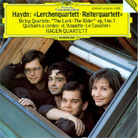 |
| April 15, 2004  The
Hagen Quartet’s Haydn The
Hagen Quartet’s Haydn
In initiating this feature last month, we attempted to distinguish between such concepts as "the greatest" and "the best." The latter seems to depend more on measurable factors, the former on more philosophical concepts. The specimen chosen to represent "the best" in the category of orchestral recordings -- Sir Adrian Boult’s stereophonic remake, with the London Philharmonic Orchestra on Decca, of the ballet music from Holst’s opera The Perfect Fool -- is a near-ideal demonstration of orchestral virtuosity, insightful direction, and recorded sound tailored not only to a specific work but to a specific performance of that work. But there would be problems in suggesting it as "the greatest," because such a term implies something on a higher level of musical substance. That is not to suggest that The Perfect Fool is unworthy or a mere trifle, but simply that it is not in the same league, in terms of substance, as Beethoven’s Eroica or Schubert big C-major Symphony. More or less the same criteria led to the selection of this superb disc, on which the Hagen Quartet plays three Haydn quartets from as many different sets [Deutsche Grammophon 423 622-2]. The quartets are Op.64 No.5, in D major ("The Lark"); the very first in the remarkable cycle, in B-flat major; and the marvelous Op.74 No.3, in G minor ("The Rider" or "The Horseman"). To be sure, there are greater quartets than any of these -- by Beethoven, Mozart, Schubert, Dvorák, Bartók, and Haydn himself, among others -- and some unforgettable performances of those greater works have been recorded over the last 75 years or so. But it would be hard to think of, or even to imagine, any recording of a string quartet that matches or surpasses this DG disc when judged by the same criteria as those used to judge The Perfect Fool. The music is on a very high level -- in the two later quartets, gloriously high -- and the performances bring out the music’s characters with an elegance, vitality, and all-round insight that render comparisons gratuitous. The recording recertifies these virtues by putting everything in a perspective that can only be called ideal. The Hagen Quartet is a family business. The three young siblings from Salzburg formed the group about 25 years ago, when they were teenagers studying at their hometown’s Mozarteum. Lukas Hagen, the leader, was born in 1962; his sister Veronika, the violist, was born the following year, and their brother Clemens, the cellist, was born in 1966. With their original second violinist, Annette Bik, the Hagens made their big breakthrough at the Lockenhaus Chamber Music Festival of 1981, and six years later they recorded the Mozart and Weber Clarinet Quintets with Eduard Brunner, principal clarinetist of the Bavarian Radio Symphony Orchestra [DG 419 600-2]. By the time they made this Haydn recording, in May 1988, they had a new second violin, Rainer Schmidt, who is still with them. They subsequently recorded a three-disc set of all of Mozart’s pre-Vienna quartets [DG 431 645-2], and some Beethoven and Schubert works, the latter never issued in the US. From their start with DG they have had the same production team -- executive producer Steven Paul, and producer and engineer Wolfgang Mitlehner -- and have been blessed with a sound that does full justice to the music and their idiomatic yet refreshing presentations. All of the Hagens’ too few recordings have been "keepers," but this one is the one to save if the house catches fire. There is simply nothing quite like it, and the final work on the disc, Op.74 No.3, is the best of the best.
Unfortunately, a further parallel with Boult’s Perfect Fool is that Universal deleted this gem from its US catalog some time ago. The company has not been that foolish overseas. Some of the bigger domestic retailers regularly import this disc, but for about $22; the options are: a) searching through the cutout bins at your favorite stores, b) ordering from UK or Continental retailers, or c) hoping against hope that it will return to regular circulation, perhaps even in a mid-price reissue series -- though the last seems discouragingly unrealistic. But anyone who enjoys outstanding quartet playing will recognize this item as indispensable and can only feel that the premium price is well spent. ...Richard Freed
Ultra Audio is part of the SoundStage! Network. |
 Haydn’s Op.64 and 74 are related to
his two triumphal visits to London. When he arrived there for the first time, in 1791, he
brought the Op.64 set with him, and those six quartets effectively augmented the stunning
impression he made with the six symphonies he introduced during that sojourn, Nos. 93-98.
Haydn’s next six quartets -- three in Op.71, three in Op.74 -- were composed in
Vienna when he was preparing for his even more remarkable second visit to the British
capital. The one that concludes this CD, "The Rider," has always been the most
popular of its group, but it has never, in my memory, received a recording that is at once
as subtle and enlivening, as brilliant and as warm-hearted, as this one. The Hagens, even
in their early and middle twenties, clearly fully understand Haydn’s reference to
"the mellowness of old age honorably won" in the music he wrote for London.
Haydn’s Op.64 and 74 are related to
his two triumphal visits to London. When he arrived there for the first time, in 1791, he
brought the Op.64 set with him, and those six quartets effectively augmented the stunning
impression he made with the six symphonies he introduced during that sojourn, Nos. 93-98.
Haydn’s next six quartets -- three in Op.71, three in Op.74 -- were composed in
Vienna when he was preparing for his even more remarkable second visit to the British
capital. The one that concludes this CD, "The Rider," has always been the most
popular of its group, but it has never, in my memory, received a recording that is at once
as subtle and enlivening, as brilliant and as warm-hearted, as this one. The Hagens, even
in their early and middle twenties, clearly fully understand Haydn’s reference to
"the mellowness of old age honorably won" in the music he wrote for London.